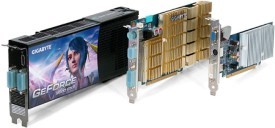NForce 780a Hybrid SLI Tested
Introduction
The end may be near for discrete chipsets, at least if NVidia has its way, but does this mean an end for performance motherboards ? Often considered the bane of performance computing, integrated graphics will soon be found on all of the firm’s products. If that idea sends chills down your spine, NVidia is hoping that today’s launch will change your mind.
Welcome to the era of Hybrid SLI, where mainstream discrete cards are to receive a small performance boost from an integrated controller, while systems with high-end graphics benefit from increased energy efficiency. Under the banner of GeForce Boost, GeForce 8400GS and 8500GT graphics cards benefit from the 3D power of NVidia’s onboard graphics processor, by sharing the workload. At the other end of the market, NVidia’s HybridPower technology allows onboard graphics to take over display needs in 2D applications, powering down 9800GTX and 9800GX2 processors when 3D performance isn’t needed. These technologies are mutually exclusive, and while NVidia has promised expanded support for Hybrid SLI in upcoming drivers, the company isn’t prepared to state which technology will be applied to any specific model.
AMD’s Socket AM2+ might seem an unlikely candidate for high-end platform development, but NVidia had let its AMD-compatible product line languish so long that they had to either act quickly upon this market or watch it slip away. For AMD’s part, improvements in its Phenom line have at least made these a viable performance value.
The 780a SLI Northbridge is actually a single-device chipset, with all but three of its PCI-Express pathways re-routed to the nForce 200 PCI-Express 2.0 bridge. The diagram shows support for three x16 graphics cards, but nForce 200 only supports 32 pathways. Three-way SLI configuration requires one of the x16 slots to share its pathways in dual x8 mode.
NVidia lists a broad range of cutting-edge features for its 780a SLI chipset, but Hybrid SLI is the only one not seen before in the company’s products. Even the nForce 200 bridge is carried over from the company’s previous Intel parts, and the new-found support for DDR2-1066 memory is a feature of the latest AMD Phenom processor’s on-die memory controller.
NVidia wouldn’t be happy unless we at least mentioned the 780a’s compatibility with ESA, the firm’s "open source" monitoring, reporting and adjustment utility for controlling clock speeds, component voltage, and cooling across multiple system devices. But today’s focus will be on the chipset’s unique feature, Hybrid SLI, and the performance or energy efficiency advantages it offers.
Get Tom's Hardware's best news and in-depth reviews, straight to your inbox.
-
cappster I am interested in seeing a high end card paired with the hybrid graphics. It kind of leaves an empty taste in my mouth with just testing the low end crap cards.Reply -
scooterlibby "we were unable to test the chipset’s HybridPower capabilities"Reply
You'd think after writing this sentence they'd realize the article is pretty much moot, just read the title. -
piratepast40 Why is there no mention of the 780g platform and Hybrid Crossfire? The author makes it sound like Nvidia is the first out the door with the concept. I'm not saying one is better than the other but the bias is rather striking.Reply -
Crashman The article had to be published on release day, in spite of the motherboard failing before 9800GX2 testing could be completed. NVidia isn't going to be happy either, considering the target market of the chipset.Reply -
johnbilicki Asus is the Realtek of motherboards.Reply
You guys should RMA the board when it becomes publicly available provided it's not some supped up board merely for review purposes as Asus has been busted for. Oh whoever does the RMA should do it from home so they don't make the review connection so you can get the same crappy treatment I did.
Then when you receive the RMA replacement please let us know if it's new or used and if there is any sperm on the north bridge.
If the review wasn't marred by an Asus product then this would have been a top read. Well, at least we know nVidia has something fresh for AMD. We'll just have to wait until the Asus flood dries up so we can get reviews from manufacturers with class such as Gigabyte and MSI. Right now there is only decent true 16X+16X SLI motherboard for socket AM2 on Newegg, it's a Biostar motherboard. -
wild9 ReplyMany games are limited by the CPU rather than the graphics chip, so we needed a top processor model.
Past a certain resolution, I think most games are limited by the GPU. Some games will show hardly any difference between a fast processor and a slow one, assuming both processors are modern dual-core parts. The differences between Intel and AMD processors can be large, but it's not consistent. -
wild9 So now we have nVidia 780a and AMD 780g chipsets..both available for AMD-based motherboards. This might lead to some confusion amongst prospective consumers.Reply -
wild9 ReplyAt the other end of the performance scale, the 9800GX2 is so powerful that the AMD Phenom X3 8750 is unable to keep up (Prey).
lol, 112fps..that's more than enough - if you have a spare Phenom you don't need I can put it to good use :D

